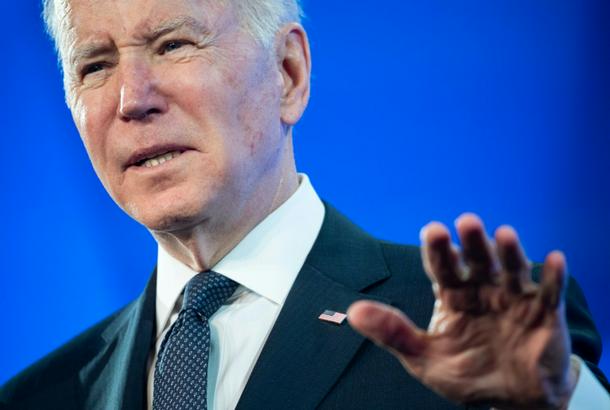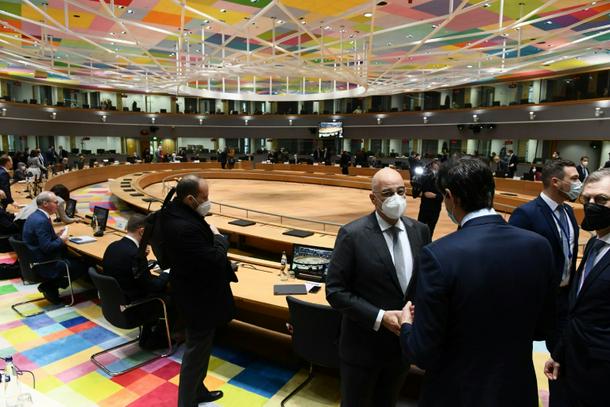
US President Joe Biden talked by video conference with European allies on the Ukraine crisis
Washington (AFP) - The United States put 8,500 troops on alert Monday over the growing tension in Ukraine and President Joe Biden called European allies in an effort to maintain Western unity against Russian pressure.
The European Union, meanwhile, urged allies to avoid a “nervous breakdown” in the face of fears that Russia could stage a full-scale invasion of Ukraine.
Despite insisting he has no intention of attacking, President Vladimir Putin has deployed some 100,000 troops close to Ukraine, where Russia already seized Crimea in 2014 and backs a separatist army in the east.
In Washington, Pentagon spokesman John Kirby said the US force of up to 8,500 was on “heightened alert,” but the troops were not yet being deployed. Most of the troops would be used to boost the NATO Response Force if it were to be activated.
“What this is about… is reassurance to our NATO allies,” Kirby said. “It sends a very clear signal to Mr Putin that we take our responsibilities to NATO seriously.”
NATO also said it was sending jets and ships to bolster its eastern flank.
The tension helped fuel instability in global markets, while Russia’s main stock index plunged and the central bank suspended foreign currency purchasing after the ruble slumped.
Moscow is demanding a guarantee that Ukraine, a former Soviet republic, never be allowed to join NATO, as well as other concessions by the United States in return for a decrease in tension.
The United States and NATO have rejected the Russian demands and told Putin to de-escalate, warning that a Russian attack on Ukraine will trigger “severe” economic sanctions and a beefed-up NATO presence in eastern Europe.
The French government announced that Russian and Ukrainian officials would meet, along with French and German counterparts, in Paris on Wednesday to try to find a way out of the impasse.
- Unity search -
As the crisis drags on, Washington is trying to maintain transatlantic and NATO unity against Russia, which supplies about 40 percent of the European Union’s natural gas.
Biden held a secure video call lasting an hour and 20 minutes with the leaders of France, Germany, Britain, Italy, Poland, the EU and NATO, the White House said.

US Secretary of State Tony Blinken joined EU foreign ministers by video link as the allies discussed a massive sanctions package to deter Russian aggression against Ukraine
The White House said the talks were “part of our close consultation and coordination.”
And Kirby insisted “there is no daylight” between Washington and EU allies.
Echoing other US warnings, Kirby said intelligence shows “it’s very clear that the Russians have no intention right now of de-escalating.”
However, some European leaders are signaling they feel less alarmed.
In Brussels, EU foreign policy chief Josep Borrell said after talks with US top diplomat Antony Blinken that there was nothing to suggest an “immediate” Russian attack.
“You have to stay calm doing what you have to do, and avoid a nervous breakdown,” he said.
While Britain and Australia followed the United States in ordering diplomats’ families to leave Kyiv, the EU and the Ukrainian government said any withdrawal of foreign embassy personnel was premature. France told citizens to avoid non-essential travel to the country.
- NATO troops ‘on standby’ -

NATO chief Jens Stoltenberg insisted the alliance 'will continue to take all necessary measures to protect' members and was considering deploying fresh battle groups to eastern allies
The US-led NATO alliance said its members were placing troops “on standby” and sending ships and jets to bolster eastern Europe’s defenses in response to the Russian buildup, pointing to recent decisions by Denmark, Spain and the Netherlands to mobilize forces.
NATO chief Jens Stoltenberg insisted the alliance “will continue to take all necessary measures to protect” members.
The Kremlin accused NATO of “hysteria.”
It also claimed that Ukrainian troops fighting Russian-backed separatists in the east of the country could launch an offensive, prompting President Volodymyr Zelensky’s office to say that Ukraine will not “succumb to provocations.”
The United States has warned that Moscow could manufacture a “false flag” incident in Ukraine to be able to then frame an invasion as a justified response.
- EU differences -
The European Union and the United States are trying to agree on a package of sanctions against Moscow that it hopes will deter Russia.
But the 27-nation bloc faces a complex task, as members have starkly differing approaches and ties to Russia.
The new government in EU economic powerhouse Germany has faced criticism from Kyiv over its refusal to send arms to Ukraine and hesitation over one of the harshest economic punishments being discussed – cutting Moscow from the global SWIFT payment system.
German Foreign Minister Annalena Baerbock insisted any further aggression from Moscow would get a “clear response” from Europe and talked up the economic support Berlin gives Kyiv.
European Commission chief Ursula von der Leyen said the bloc was preparing a 1.2-billion-euro emergency financial aid package for Ukraine.
Non-NATO member Ireland meanwhile sounded the alarm over upcoming Russian military exercises off its southwest coast in the international waters of the Atlantic.
burs-sms/ec